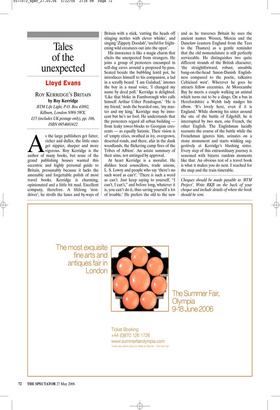Tales of the unexpected
Lloyd Evans
ROY KERRIDGE’S BRITAIN by Roy Kerridge BTM Life Light, P.O. Box 43892, Kilburn, London NW6 5WX, £15 (includes UK postage only), pp. 166, ISBN 0954681622 As the large publishers get fatter, richer and duller, the little ones get nippier, sharper and more vigorous. Roy Kerridge is the author of many books, but none of the grand publishing houses wanted this eccentric and highly personal guide to Britain, presumably because it lacks the amenable and forgettable polish of most travel books. Kerridge is charming, opinionated and a little bit mad. Excellent company, therefore. A lifelong ‘nondriver’, he strolls the lanes and by-ways of Britain with a stick, ‘cutting the heads off stinging nettles with clever whisks’, and singing ‘Zippety Doodah’, ‘useful for frightening wild creatures out into the open’.
His innocence is like a magic charm that elicits the unexpected from strangers. He joins a group of protesters encamped in self-dug caves around a proposed by-pass. Seated beside the bubbling lentil pot, he introduces himself to his companion, a lad in a scruffy beard. ‘I am Galahad,’ intones the boy in a nasal voice, ‘I changed my name by deed poll.’ Kerridge is delighted. ‘Like that bloke in Farnborough who calls himself Arthur Uther Pendragon.’ ‘He is my friend,’ nods the bearded one, ‘my master and my king.’ Kerridge may be innocent but he’s no fool. He understands that the protesters regard all urban building from leaky tower-blocks to Georgian crescents — as equally Satanic. Their vision is of ‘empty cities, swathed in ivy, overgrown, deserted roads, and there, afar in the dank woodlands, the flickering camp fires of the Tribes of Albion’. An astute summary of their aims, not untinged by approval.
At heart Kerridge is a moralist. He dislikes local councillors, trade unions, L. S. Lowry and people who say ‘there’s no such word as can’t’. ‘There is such a word as can’t. Just keep saying to yourself, “I can’t, I can’t,” and before long, whatever it is, you can’t do it, thus saving yourself a lot of trouble.’ He prefers the old to the new and as he traverses Britain he uses the ancient names Wessex, Mercia and the Danelaw (eastern England from the Tees to the Thames) as a gentle reminder that the old nomenclature is still perfectly serviceable. He distinguishes two quite different strands of the British character, ‘the straightforward, robust, unsubtle bang-on-the-head Saxon-Danish Englishness compared to the poetic, talkative Celticised west’. Wherever he goes he attracts fellow eccentrics. At Morecambe Bay he meets a couple walking an animal which turns out to be a dingo. On a bus in Herefordshire a Welsh lady nudges his elbow. ‘It’s lovely here, even if it is England.’ While showing his sister around the site of the battle of Edgehill, he is interrupted by two men, one French, the other English. The Englishman lucidly recounts the course of the battle while the Frenchman ignores him, urinates on a stone monument and starts winking suggestively at Kerridge’s blushing sister. Every step of this extraordinary journey is seasoned with bizarre random moments like that. An obvious test of a travel book is what it makes you do next. I reached for the map and the train timetable.
Cheques should be made payable to ‘BTM Project’. Write RKB on the back of your cheque and include details of where the book should be sent.










































































































 Previous page
Previous page